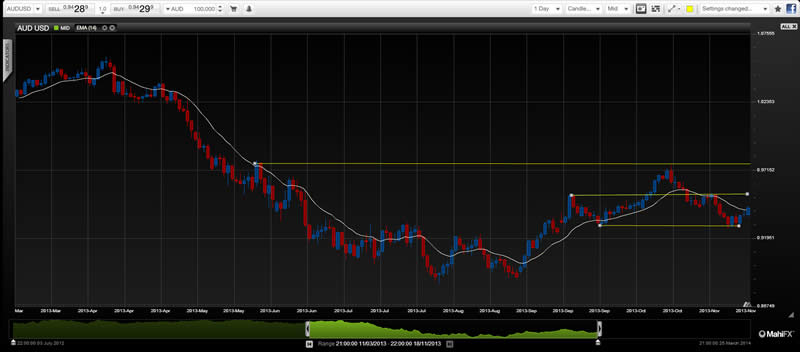Don't Bet on China Sustaining the Commodity Super Cycle
Commodities / Commodities Trading Nov 20, 2013 - 05:45 PM GMTBy: Submissions
Justin Pugsley writes: China, the world's number one consumer of so many raw materials apparently looks set to carry on buying following bold reforms announced at the third plenum of the communist leadership. But it could be a long wait before they buoy commodity currencies if indeed they ever will.
Some of the reforms announced are ground breaking: The one child policy is to be relaxed. Measures are to be taken to make it easier for rural citizens to live in most of the big cities. And the market is to be given a greater role in allocating economic resources by 2020.
The first measure won't have an impact on the economy for a very long time. In fact, as more women move to the cities, and if current experience is anything to go by, they may be inclined to have less children. This is due to issues such as work pressures and real estate costs.
The second measure could have more impact. But in the medium term. City workers tend to earn more than their rural counterparts and are usually more productive. If all goes to plan China will increasingly evolve into a consumer society. This would boost demand for white goods, luxury items, cars and other manufactures. Also, more accommodation will need to be built to house them along with other infrastructure to support growing city populations.
For many analysts that's a good enough reason to declare that the commodity super-cycle is alive and well. But it's far from being a foregone conclusion. And that matters for the long-term performance of currencies such as AUD, NZD and ZAR, which have benefited from China's commodity consumption boom.
China may not be so supportive of AUD in future

Getting old before getting rich
For all its determination and vast human resources China does face one huge challenge. Thanks to the one child policy, introduced in 1979, China now has a rapidly ageing population. The number of Chinese citizens over 65 will triple to 300 million by 2030. This will be a potential drain on the country's dynamism. And though China has doubled life expectancy to 75 since 1949, fertility rates are just 1.5, well below the 2.1 required for a stable population, and also lower than in many developed countries.
Despite its vast population, China is in fact rapidly heading towards labour shortages. There are signs this is already happening and by 2030 the labour force is set to contract by 100 million. This calls for a rapid and sustained productivity gains.
Another measure, which could have a mixed impact is giving the markets a decisive role in commodity pricing. This means numerous market distorting subsidies are to be withdrawn. Market pricing will make China more price sensitive, read potentially more volatile demand patterns. It will also potentially encourage greater resource conservation.
A further issue is that China has created an asset bubble of its own over the last five years to counter the effects of the financial crisis in the West. Unwinding that is likely to be painful and potentially deflationary.
Also, China's rate of GDP growth is expected to slow considerably in the coming years. It has passed the 'easy growth' stage, which largely required laying down infrastructure and exporting lots of goods. Moving towards becoming a developed economy is harder.
But for forex traders possibly one of the most enticing measures that was hinted at is the possibility that the CNY will eventually become a free floating currency.
By Justin Pugsley, Markets Analyst MahiFX
Follow MahiFX on twitter at: https://twitter.com/MahiFX
Disclaimer: This material is considered a public relations communication for general information purposes and does not contain, and should not be construed as containing, investment advice or an investment recommendation, or an offer of or solicitation for any transactions in financial instruments. MahiFX makes no representation and assumes no liability as to the accuracy or completeness of the information provided.
The use of MahiFX’s services must be based on your own research and advice, and no reliance should be placed on any information provided or comment made by any director, officer or employee of MahiFX. Any opinions expressed may be personal to the author, and may not reflect the opinions of MahiFX, and are subject to change without notice.
About MahiFX
MahiFX is headed by David Cooney, former global co-head of currency options and e-FX trading at Barclays Capital and responsible for the award winning e-commerce platform BARX and Susan Cooney, former head of e-FX Institutional Sales in Europe for Barclays Capital. Operating as a market maker, MahiFX provides traders direct access to institutional level execution speeds and spreads through its proprietary-built fully automated pricing and risk management technology, lowering the cost of retail forex trading.
MahiFX global operations are headquartered in Christchurch, New Zealand with offices in London, UK with development and support teams in both locations for 24 hour service. The company is regulated by The Australian Securities and Investments Commission (ASIC), Australia’s corporate, markets and financial services regulator.
© 2005-2022 http://www.MarketOracle.co.uk - The Market Oracle is a FREE Daily Financial Markets Analysis & Forecasting online publication.



